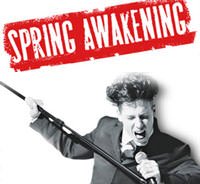Spring Awakening – 2011 National Tour
Book and Lyrics by Steven Sater
Music by Duncan Sheik
Based on the play by Frank Wedekind
Directed by Lucy Skilbeck
Music Directed by Kasey RT Graham
Choreography by JoAnn M. Hunter
So I come back to my little plot, prop up my cross, which the madcap so heedlessly trampled down, and when everything’s in order, I lay on my back again, warm myself on the decay, and laugh.
Spring Awakening, when first written by Frank Wedekind in 1891, was meant to be an indictment of fin de siècle methods of child-rearing and education in Germany. 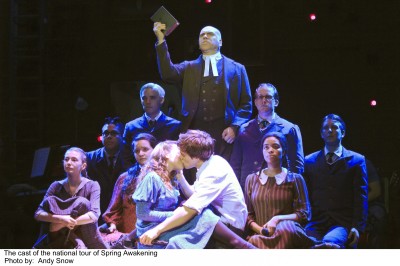 It is a story of how a lack of knowledge about sex can lead to ill circumstances: it can end in death and ruin. In fact, one of the main characters, who commits suicide, is based on a classmate of the playwright. The play remained unproduced for 20 years, and when it finally was, audiences were scandalized. In New York, the city’s Commissioner of Licenses tried to shut it down, and it was only allowed to play for one matinee performance. Indeed, a 1963 London production of the play was highly censored. This is all to say: the material is shocking, to a degree, and, to a degree (though less and less, now, especially in less zealously religious states), is still relevant today. It is a denunciation of puritanical practices repressing sexual behavior, and even knowledge, in teenagers.
It is a story of how a lack of knowledge about sex can lead to ill circumstances: it can end in death and ruin. In fact, one of the main characters, who commits suicide, is based on a classmate of the playwright. The play remained unproduced for 20 years, and when it finally was, audiences were scandalized. In New York, the city’s Commissioner of Licenses tried to shut it down, and it was only allowed to play for one matinee performance. Indeed, a 1963 London production of the play was highly censored. This is all to say: the material is shocking, to a degree, and, to a degree (though less and less, now, especially in less zealously religious states), is still relevant today. It is a denunciation of puritanical practices repressing sexual behavior, and even knowledge, in teenagers.
So this material could be really vital, really brutal, heart wrenching stuff. But instead it’s just entertainment. It doesn’t really grapple with the issues, you don’t leave the theater thinking about how our school systems need to be changed, updated, for the times. You leave thinking, “Well, that was fun. Now, what’s for dinner?”—or whatever. It leaves you with, “Those kids have it rough; I’m glad we don’t do silly stuff like that anymore –not telling your daughter how women get pregnant.” 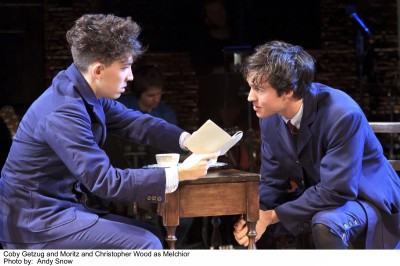 But we do. This production does not bring the issues home to us. It is fluff. And as fluff, it’s fine. It’s entertaining. The songs are pretty good; the production – the sets, lighting, costumes – were really excellent; the singing solid; the band generally tight. The acting left something to be desired. The male leads, Christopher Wood and Coby Getzug (Melchior and Moritz, respectively) were awful. They were incredibly affected. Very “I’m acting!” Elizabeth Judd (Wendla) was good; and Courtney Markowitz was a fine Ilse. Hänschen (Devon Stone) was good, as well (though why they kept the diminutive -chen and didn’t simply change the name to “Little Hans” or “Hansy” is beyond me – it just sounded weird, and American audiences won’t understand that his actual name is Hans, and Hänschen is a term of endearment). The choreography was stilted and awkward. The direction was uninspired. The musical direction was very loose, almost lazy.
But we do. This production does not bring the issues home to us. It is fluff. And as fluff, it’s fine. It’s entertaining. The songs are pretty good; the production – the sets, lighting, costumes – were really excellent; the singing solid; the band generally tight. The acting left something to be desired. The male leads, Christopher Wood and Coby Getzug (Melchior and Moritz, respectively) were awful. They were incredibly affected. Very “I’m acting!” Elizabeth Judd (Wendla) was good; and Courtney Markowitz was a fine Ilse. Hänschen (Devon Stone) was good, as well (though why they kept the diminutive -chen and didn’t simply change the name to “Little Hans” or “Hansy” is beyond me – it just sounded weird, and American audiences won’t understand that his actual name is Hans, and Hänschen is a term of endearment). The choreography was stilted and awkward. The direction was uninspired. The musical direction was very loose, almost lazy.
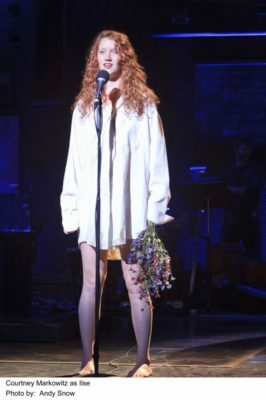 And the adaptation of the text leaves something to be desired. For instance, both the play and the musical more or less open with Wendla asking her mother how babies are conceived; her mother tells her that, when she’s married and loves a man very much . . . well, it happens. Key components: marriage and love. Later, when she and Melchior have sex, in the play, she says, “Man liebt sich – wenn man küßt” (“One makes love – when one kisses”) to which Melchior replies, „O glaub mir, es gibt keine Liebe! – Alles Eigennutz, Alles Egoismus! – Ich liebe dich so wenig, wie du mich liebst“ (“Oh, believe me, there is no love! All self-interest, all egoism! I love you as little as you love me”). So you see, for Wendla, both key components are missing for a child. And so she succumbs (rather reluctantly – there are a lot of “no!”s), but never imagines what could come of it. This is deemphasized in the musical, to its great detriment. There is no such line, a line that essentially gives her permission to have sex with him. Instead, it’s all about them wanting each other. Well, this detracts from the very purpose of the play: it makes it less of a condemnation of the prudish culture. It makes it “sexier.” The kids actually simulate the sex on stage – twice, actually: before and after intermission. This, I suppose, is neither here nor there, but is something audience members should be aware of, if it would make them uncomfortable (something that otherwise the musical doesn’t really do – sex becomes more of a joke – but something the play thrives on).
And the adaptation of the text leaves something to be desired. For instance, both the play and the musical more or less open with Wendla asking her mother how babies are conceived; her mother tells her that, when she’s married and loves a man very much . . . well, it happens. Key components: marriage and love. Later, when she and Melchior have sex, in the play, she says, “Man liebt sich – wenn man küßt” (“One makes love – when one kisses”) to which Melchior replies, „O glaub mir, es gibt keine Liebe! – Alles Eigennutz, Alles Egoismus! – Ich liebe dich so wenig, wie du mich liebst“ (“Oh, believe me, there is no love! All self-interest, all egoism! I love you as little as you love me”). So you see, for Wendla, both key components are missing for a child. And so she succumbs (rather reluctantly – there are a lot of “no!”s), but never imagines what could come of it. This is deemphasized in the musical, to its great detriment. There is no such line, a line that essentially gives her permission to have sex with him. Instead, it’s all about them wanting each other. Well, this detracts from the very purpose of the play: it makes it less of a condemnation of the prudish culture. It makes it “sexier.” The kids actually simulate the sex on stage – twice, actually: before and after intermission. This, I suppose, is neither here nor there, but is something audience members should be aware of, if it would make them uncomfortable (something that otherwise the musical doesn’t really do – sex becomes more of a joke – but something the play thrives on).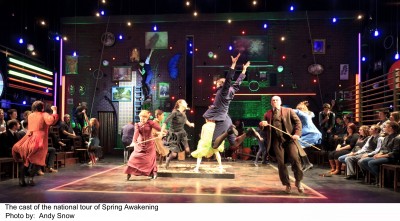
There are other aspects of the adaptation that make more sense: the odd character of “The Masked Man” is dumped in the final scene, replaced by Wendla’s ghost. (The final scene is something I have an issue with in the original play, but that issue is something I shan’t get into here, as it is not strictly relevant to the musical adaptation.) And Wendla, at the play’s beginning, does not ask her mother about death – there are several instances where the plot has been streamlined, as one would expect with a musical, and that is fine. And the final number, with the ghosts, is somewhat expected. (Although the play closing with only the ghost of Moritz on stage delivering the final monologue leaves us with a feeling of unease not dissimilar to Pandarus offering the audience his diseases.) But I left feeling unfulfilled. For fluff, it’s fine; but fluff doesn’t suite me, especially when it should be so much more.
Somewhat recommended
Will Fink
Reviewed on 5.3.11
For full show information, visit TheatreinChicago.
At the Oriental Theater, 24 W. Randolph St., Chicago, IL; call (800)775-2000 or visit www.broadwayinchicago.com; performances Wednesday and Thursday at 7:30, Friday at 8pm, Saturday at 2 & 8pm, Sunday at 2 & 7:30; running time 2 hours 15 minutes, one intermission; this week only – through May 8, 2011

